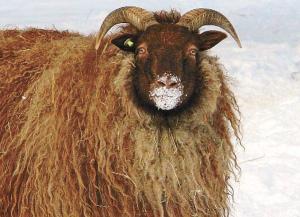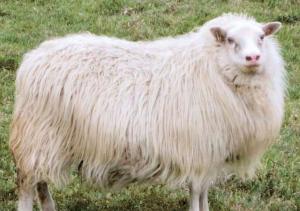1,200-Year Old Sheep Breed Still Going Strong
Icelandic sheep are one of the oldest sheep breeds in the world. They have been bred with no outside bloodlines for around 1,200 years. Introduced to Canada in the late 1980’s, they made it to the U.S. in the early 1990’s. Their meat and wool quality, combined with good mothering, make them a great choice for small flocks.
“When I considered breeding sheep, I was dismayed at the demeanor of a lot of sheep, as they aren’t terribly smart,” says Elaine Clark, president, Icelandic Sheep Breeders of North America and owner of one of the oldest flocks in the U.S. “The Icelandic sheep seemed more intelligent. They are one of the more primitive breeds, along with Jacobs and Shetland. They haven’t changed much over the centuries.”
Icelandics are considered a mountain breed. Historically, such a breed’s meat is milder in flavor than lowland breeds.
Clark suggests the pure bloodlines going back so long makes the rams excellent terminal crosses with other breeds.
“Because they are so unrelated to conventional breeds, they bring a lot of hybrid vigor to the cross for excellent meat production,” says Clark.
Even purebred Icelandics are good meat producers. She has butchered ram lambs fattened on grass and their mothers’ milk at 5 to 6 months of age and had them dress out at 35 to 40 lbs. She says the pelts at that age are very valuable.
Icelandic ewes are described as good mothers, producing high quality milk and usually producing twins. A gene in the breed causes multiple births. If the ewe has 2 copies of the gene, it can lead to triplets, quads, quints and even sextuplets. A single gene increases the rate of triplets.
Some breeders will expose ewe lambs to rams, although most wait for the following breeding season. Once they start, they usually continue to breed until 10 years of age and some continue to 12 to 14 years.
Ewes are seasonal breeders, beginning in October and continuing to cycle until bred. Rams are active year round and can start breeding at 5 to 6 mos. of age.
The lambs are very vigorous, usually up and nursing within 5 min. of birth, one reason Clark thinks they are seldom abandoned by the mother.
“Icelandics don’t require grain if they have access to good pasture or high quality hay,” says Clark.
She notes that they are good browsers, cleaning up brambles and shrubs as well as grass. They are also good wool producers, generally being sheared twice a year. Their wool is usually a mix of black, brown and white in solid patterns or shades. Spotting often occurs on top of other patterns.
“They have a ‘wool break’ in the spring before lambing,” says Clark. “You can pull away most of the wool, but it won’t be as clean as shearing. Most breeders shear before or after lambing.”
Clark says the spring wool clip is often used for felting, while the heavier fall wool clip is a higher quality and in demand from spinners.
“Icelandic fall fleeces are dual-coated and typically weigh from 4 to 6 lbs.,” says Clark. “However, because they don’t have a lot of lanolin, the wool loses only 20 percent of its weight when washed, compared to other breeds that will lose 50 percent.”
Clark describes the Icelandics as fine boned with a strong meat-to-bone ratio. Ewes run 140 to 160 lbs., while rams reach 175 to 200 lbs. With the exception of breeding season, she describes her rams as very easy to work with.
“Aggression is an inherited trait, and any animal that is aggressive ends up in the freezer,” says Clark. “There is no reason to keep a sheep that isn’t easy to handle.”
Those that are kept can range in price from $150 each to as much as $1,000, says Clark. “The price for an animal depends on its bloodlines and age,” she says. “A newly bred ewe will be priced significantly different from one that is 3 to 4 years old and a proven breeder.”
She notes that the reputation and number of years in the breed can also make a difference. “We have a good reputation and have been breeding Icelandics for 23 years,” she says. “Our breeding stock hold their price.”
Contact: FARM SHOW Followup, Elaine Clark, P.O. Box 54, Limerick, Maine 04048 (ph 207 793-4640; frelsi@roadrunner.com; www.isbona.com).

Click here to download page story appeared in.
Click here to read entire issue
1 200-Year Old Sheep Breed Still Going Strong LIVESTOCK Sheep/Goats Icelandic sheep are one of the oldest sheep breeds in the world They have been bred with no outside bloodlines for around 1 200 years Introduced to Canada in the late 1980’s they made it to the U S in the early 1990’s Their meat and wool quality combined with good mothering make them a great choice for small flocks “When I considered breeding sheep I was dismayed at the demeanor of a lot of sheep as they aren’t terribly smart ” says Elaine Clark president Icelandic Sheep Breeders of North America and owner of one of the oldest flocks in the U S “The Icelandic sheep seemed more intelligent They are one of the more primitive breeds along with Jacobs and Shetland They haven’t changed much over the centuries ” Icelandics are considered a mountain breed Historically such a breed’s meat is milder in flavor than lowland breeds Clark suggests the pure bloodlines going back so long makes the rams excellent terminal crosses with other breeds “Because they are so unrelated to conventional breeds they bring a lot of hybrid vigor to the cross for excellent meat production ” says Clark Even purebred Icelandics are good meat producers She has butchered ram lambs fattened on grass and their mothers’ milk at 5 to 6 months of age and had them dress out at 35 to 40 lbs She says the pelts at that age are very valuable Icelandic ewes are described as good mothers producing high quality milk and usually producing twins A gene in the breed causes multiple births If the ewe has 2 copies of the gene it can lead to triplets quads quints and even sextuplets A single gene increases the rate of triplets Some breeders will expose ewe lambs to rams although most wait for the following breeding season Once they start they usually continue to breed until 10 years of age and some continue to 12 to 14 years Ewes are seasonal breeders beginning in October and continuing to cycle until bred Rams are active year round and can start breeding at 5 to 6 mos of age The lambs are very vigorous usually up and nursing within 5 min of birth one reason Clark thinks they are seldom abandoned by the mother “Icelandics don’t require grain if they have access to good pasture or high quality hay ” says Clark She notes that they are good browsers cleaning up brambles and shrubs as well as grass They are also good wool producers generally being sheared twice a year Their wool is usually a mix of black brown and white in solid patterns or shades Spotting often occurs on top of other patterns “They have a ‘wool break’ in the spring before lambing ” says Clark “You can pull away most of the wool but it won’t be as clean as shearing Most breeders shear before or after lambing ” Clark says the spring wool clip is often used for felting while the heavier fall wool clip is a higher quality and in demand from spinners “Icelandic fall fleeces are dual-coated and typically weigh from 4 to 6 lbs ” says Clark “However because they don’t have a lot of lanolin the wool loses only 20 percent of its weight when washed compared to other breeds that will lose 50 percent ” Clark describes the Icelandics as fine boned with a strong meat-to-bone ratio Ewes run 140 to 160 lbs while rams reach 175 to 200 lbs With the exception of breeding season she describes her rams as very easy to work with “Aggression is an inherited trait and any animal that is aggressive ends up in the freezer ” says Clark “There is no reason to keep a sheep that isn’t easy to handle ” Those that are kept can range in price from $150 each to as much as $1 000 says Clark “The price for an animal depends on its bloodlines and age ” she says “A newly bred ewe will be priced significantly different from one that is 3 to 4 years old and a proven breeder ” She notes that the reputation and number of years in the breed can also make a difference “We have a good reputation and have been breeding Icelandics for 23 years ” she says “Our breeding stock hold their price ” Contact: FARM SHOW Followup Elaine Clark P O Box 54 Limerick Maine 04048 ph 207 793-4640; frelsi@roadrunner com; www isbona com
To read the rest of this story, download this issue below or click
here to register with your account number.








